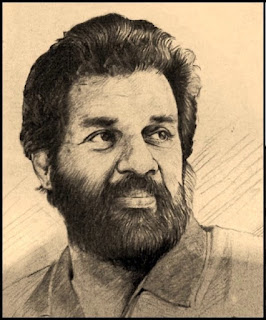If you are a silver-haired veteran rasika, try explaining to the current generation of Carnatic consumers who are steadily fed on the Zomato/Swiggy fare of Youtube airbrushed videos, FB, Instagram reels and so on that once upon a time, one indeed went to great lengths to go and sit in a classical Carnatic concert featuring just a violin, with mridangam and ghatam, that went on for 3 hours. It would be impossible for them to relate to. Indeed, silver-haired veterans too are indeed feeding on such "clips" nowadays instead of the long-braided concerts on stage! What a quarantine from real Carnatic music!
The Lalgudi-Parvathi connection has been well documented in this blog. There are over 40 posts mentioning the maestro and his great achievements as well as his emotional bond with the family of Parvathi. In our lives, many such associations are divinely ordained. This is our way of celebrating the Bharatiya culture with no barriers of language or region.
This concert features a solo violin rendition, unlike many other Parvathi concerts where the doyen was featured along with his children. Here, he is accompanied on the mridangam by Vid. Vellore Ramabhadran and on the khanjira by Vid. Ramachar. The mridangam follows the violin like a musical shadow. You can notice this in every song in this concert, especially in Vasantha, where the maestro presents a majestic rupaka-driven swara array.
The master of manodharma often conjures up a dialogue between the two personas inhabiting his single four-stringed violin with such juicy content that you marvel at his multidimensional musical imagination- especially with his multi-string bowing which is simply awesome.
The Shankarabharana suite is a violin ensemble serenading you on an oceanliner deck matching the majesty, silvery glitter and high waves of the mighty ocean. It is a tribute to Shankarabharana with the famous composition Enduku Peddalavale of Saint Thyagaraja. The welcome inclusion of the Tani in this recording is befitting the title of the "Parvathi Finale" upload.
Come, let us celebrate a bygone era of concerts!
Held at the home of Parvathi, Sri Ramanavami, 13 April 1984.
Vellore Ramabhadran - Mridangam
H. P. Ramachar - Khanjira
Song List
1. Varnam - Bowli - Lalgudi Jayaraman
2. Sri Narada - Kanada - Thyagaraja
3. Makelara Vicharamu - Ravichandrika - Thyagaraja
4. Smarane Sukhamu - Janaranjani - Thyagaraja
5. Ramachandram Bhavayami - Vasantha - Muthuswami Dikshitar

_750x500%20copy.jpg)






















